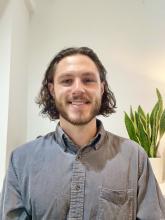This was my first time at BrightonSEO.
I’ve been in digital marketing for over two years now, and up until this point, most of the events I’d been to had leaned quite corporate - more suits, less spark. So I didn’t really know what to expect. But walking into BrightonSEO, the first thing that hit me was:
Wait, SEO’s are actually… cool?
Seriously. A room full of people from all over the world, from all kinds of backgrounds, all interested in the same thing. No suits, no fluff, just people who really care about search, strategy, and making the internet a better place. The atmosphere felt relaxed but energising, and honestly, I was into it from the start.
Not Everything Deserves a Note
I’ll start with the low point, just to get it out the way.
One of the first talks I saw on the main stage focused on how to fake reviews, fake blog authors, and fake social media profiles to build trust. Not great.
Black hat SEO in full swing. It felt very Black Mirror, and to be honest, it didn’t land well with the audience either. There was a bit of backlash in real-time, which was reassuring to see.
For me, it just reinforced what I already believed: if we’re trying to build trust, we have to earn it. Safe to say I crossed those notes out in thick black ink.
A Much Better Perspective on EEAT
Straight after that, I caught Ray Saddiq’s talk on multichannel content and proper EEAT. It was a breath of fresh air.
Instead of cutting corners, Ray spoke about building real authority, showing up in the right places, and thinking beyond just the website. His points around collaborating with creators and showing real author experience really landed with me.
It also made me think about how important off-site signals are becoming not just what you say on your site, but what others say about you elsewhere. Definitely something we’ll be carrying into our work at JLC.
Modern SEO is multichannel, and everyone should be adopting this approach.
AI Search: A New Set of Rules
As expected, AI was everywhere, especially when it comes to search engines. The talk that stood out for me was by Josh Blyskal, whose company analysed over 10 million AI search results and broke down how AI decides what content to surface.
Some standout points:
Traffic doesn’t equal citations. Sites with loads of visitors weren’t always showing up in AI-generated responses.
Backlinks didn’t correlate either. Sites with fewer backlinks often got more citations.
Being indexed by Bing matters. If you’re not in Bing, you’re not showing up in ChatGPT.
AI search has its own rules, the way it searches is fundamentally different to Google and traditional search engines. Tools like Perplexity are pulling from Reddit, PDFs, forums… not your polished blog post necessarily.
Josh made it clear that to get seen in AI results, we need to think differently about how we publish and where we show up.
Using AI Without Losing the Human Touch
There were quite a few sessions about using AI in content, and most of them circled around a similar message: if you’re not using AI for things like scripting, research or analysis, you probably should be.
Jeremy Macdonald summed it up nicely in his talk on automation and APIs, he said:
“If you’re not using AI, you’re being left behind.”
That said, most people still agreed that how you use AI matters. The consensus was: if the content is genuinely helpful, it doesn’t matter if it was written by a human or AI. That being said, most speakers still leaned towards a human doing the final edits, and I agree. AI can speed things up, but tone, nuance, and purpose still come from us.
Accessibility: Empathy Over Everything
One of the most genuinely useful talks I saw came from Liam Cumber, who ran a session called “What the f**k is alt text and how do you write it?”
He broke it down really simply:
Write alt text like you’re describing the image to someone who can’t see it.
It sounds obvious, but it’s often overlooked, especially in fast-paced content workflows. It’s not just good practice; it’s essential.
With 2.2 billion people worldwide living with visual impairment, making your site accessible isn’t just the right thing to do; it’s also a smart way to reach more people.
It was a reminder that accessibility isn’t just “nice to have”. It should be baked into how we write and build content from the start.
SEO’s Role in Sustainability
Another talk that made me think differently was from Oluwatobi Balogun, who linked SEO with sustainability.
The idea is simple: bad SEO creates digital waste. Slow websites, bloated code, and pointless pages- all of it increases server strain and energy use. Every time a search engine crawls a poorly optimised site, it’s using up resources that didn’t need to be used. Multiply that across the web, and you’re looking at a serious environmental impact.
Cleaner, faster websites don’t just improve performance; they reduce carbon emissions, use less server energy, and ultimately help shrink your digital footprint. And it’s not just good for the planet. Faster load times mean better search visibility, lower bounce rates, and higher conversions.
So, it’s a win-win-win:
Better for users, better for the planet, better for business.
This is definitely something we’ll be bringing more into our thinking at JLC. Sustainability isn’t just about what materials you use or how you ship things. It’s in the way we design, build and maintain digital content too.
A Few Quickfire Learnings
There were so many other little takeaways worth mentioning, so here are a few:
Semantic URLs win. Clear, descriptive slugs help AI understand and prioritise your content.
Don’t be vague in meta descriptions. “Spoil” the answer - it helps both users and machines.
Internal linking still matters. Use tools like Screaming Frog to scale this up.
Alt text isn’t optional. Do an audit. Make it useful.
PDFs get cited by AI. Don’t ignore them as a format.
JS-heavy pages are harder for LLMs to crawl. Keep things simple where you can.
Final Thoughts
I didn’t really know what to expect going into BrightonSEO, but I left with a notepad full of ideas, a few new perspectives, and a bit more confidence in where the industry is heading.
There’s a lot changing right now, but what I took away from the show is that SEO is still rooted in the same core things: being useful, being trustworthy, and thinking about the person on the other side of the screen.
That, and… SEO people are actually quite cool.
FAQs
Was BrightonSEO worth it?
Yes, even as someone fairly new to the industry, I took a lot from it. If you work in SEO or content, I’d recommend it.
Is AI changing SEO?
Completely. But it’s not about replacing people, it’s about using AI to work smarter, not cheaper.
Do backlinks still matter?
In traditional SEO, yes. But for AI search? Turns out not so much. Citation behaviour seems to follow different rules.
What’s one thing you’d action immediately?
Check if your site’s indexed in Bing. If it’s not, you won’t show up in tools like ChatGPT.
Why should we care about accessibility?
Because it affects real people. It’s not just about ticking boxes, it’s about making your content usable for everyone.

